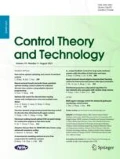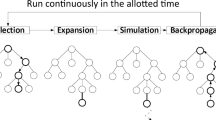Abstract
In this paper, we consider to learn the inherent probability distribution of types via knowledge transfer in a two-player repeated Bayesian game, which is a basic model in network security. In the Bayesian game, the attacker’s distribution of types is unknown by the defender and the defender aims to reconstruct the distribution with historical actions. It is difficult to calculate the distribution of types directly since the distribution is coupled with a prediction function of the attacker in the game model. Thus, we seek help from an interrelated complete-information game, based on the idea of transfer learning. We provide two different methods to estimate the prediction function in different concrete conditions with knowledge transfer. After obtaining the estimated prediction function, the defender can decouple the inherent distribution and the prediction function in the Bayesian game, and moreover, reconstruct the distribution of the attacker’s types. Finally, we give numerical examples to illustrate the effectiveness of our methods.
Similar content being viewed by others
References
R. J. Aumann, M. Maschler, R. E. Stearns. Repeated Games with Incomplete Information. Cambridge: The MIT press, 1995.
P. R. Milgrom, R. J. Weber. Distributional strategies for games with incomplete information. Mathematics of Operations Research, 1985, 10(4): 619–632.
C. d’Aspremont, L.-A. Gérard-Varet. Incentives and incomplete information. Journal of Public Economics, 1979, 11(1): 25–45.
J. C. Harsanyi. Games with incomplete information played by Bayesian players – Part I: the basic model. Management Science, 1967, 14(3): 159–182.
N. Brunner, N. Linden. Connection between bell nonlocality and Bayesian game theory. Nature Communications, 2013, 4(1): 1–6.
Y. Liu, C. Comaniciu, H. Man. A Bayesian game approach for intrusion detection in wireless ad hoc networks. Proceeding from the Workshop on Game Theory for Communications and Networks, New York: ACM, 2006: DOI https://doi.org/10.1145/1190195.1190198.
P. Paruchuri, J. P Pearce, J. Marecki, et al. Playing games for security: An efficient exact algorithm for solving Bayesian Stackelberg games. Proceedings of the 7th International Joint Conference on Autonomous Agents and Multiagent Systems, Richland: International Foundation for Autonomous Agents and Multiagent Systems, 2008: 895–902.
A. Garnaev, M. Baykal-Gursoy, H. V. Poor. Security games with unknown adversarial strategies. IEEE Transactions on Cybernetics, 2016, 46(10): 2291–2299.
S. Roy, C. Ellis, S. Shiva, et al. A survey of game theory as applied to network security. Proceedings of the 43rd Hawaii International Conference on System Sciences, Honolulu: IEEE, 2010: DOI https://doi.org/10.1109/HICSS.2010.35.
M. H. Manshaei, Q. Zhu, T. Alpcan, et al. Game theory meets network security and privacy. ACM Computing Surveys (CSUR), 2013, 45(3): 1–39.
Y. E. Sagduyu, R. Berry, A. Ephremides. MAC games for distributed wireless network security with incomplete information of selfish and malicious user types. International Conference on Game Theory for Networks, Istanbul: IEEE, 2009: 130–139.
M. Raya, R. Shokri, J.-P. Hubaux. On the tradeoff between trust and privacy in wireless ad hoc networks. Proceedings of the 3rd ACM Conference on Wireless Network Security, Hoboken: ACM, 2010: 75–80.
S. J. Pan, Q. Yang. A survey on transfer learning. IEEE Transactions on Knowledge and Data Engineering, 2009, 22(10): 1345–1359.
K. Cao, Z. Tu, Y. Ming. Class conditional distribution alignment for domain adaptation. Control Theory and Technology, 2020, 18(1): 72–80.
K. Cao, X. Bai, Y. Hong, et al. Unsupervised topological alignment for single-cell multiomics integration. Bioinformatics, 2020, 36(S1): i48–i56. DOI https://doi.org/10.1093/bioinformatics/btaa443.
Acknowledgements
The authors would like to thank Prof. Peng Yi for his helpful suggestions.
Author information
Authors and Affiliations
Corresponding author
Additional information
This work was supported by the National Key Research and Development Program (No. 2016YFB0901900) and the National Natural Science Foundation of China (No. 61733018).
Guanpu CHEN received the B.Sc. degree in Mathematics and Applied Mathematics from University of Science and Technology of China, Hefei, China, in 2017. He is currently a Ph.D. candidate in Academy of Mathematics and Systems Science, Chinese Academy of Sciences, Beijing, China. His research interests include game theory, distributed optimization and transfer learning.
Kai CAO received the B.E. degree from University of Science and Technology of China in 2017. He is currently working towards the Ph.D. degree in Academy of Mathematics and Systems Science, Chinese Academy of Sciences. His research interests include transfer learning, big data analysis and biocomputing.
Yiguang HONG received his B.Sc. and M.Sc. degrees from Peking University, China, and the Ph.D. degree from the Chinese Academy of Sciences (CAS), China. He is currently a Professor in Academy of Mathematics and Systems Science, CAS. His current research interests include nonlinear control, multiagent systems, distributed optimization/ game, machine learning, and social networks. Prof. Hong serves as Editor-in-Chief of Control Theory and Technology. He also serves or served as Associate Editors for many journals including the IEEE Transactions on Automatic Control, IEEE Transactions on Control of Network Systems, and IEEE Control Systems Magazine. He is a recipient of the Guang Zhaozhi Award at the Chinese Control Conference, Young Author Prize of the IFAC World Congress, Young Scientist Award of CAS, the Youth Award for Science and Technology of China, and the National Natural Science Prize of China. He is also a Fellow of IEEE.
Rights and permissions
About this article
Cite this article
Chen, G., Cao, K. & Hong, Y. Learning implicit information in Bayesian games with knowledge transfer. Control Theory Technol. 18, 315–323 (2020). https://doi.org/10.1007/s11768-020-0086-2
Received:
Revised:
Accepted:
Published:
Issue Date:
DOI: https://doi.org/10.1007/s11768-020-0086-2




